Understanding the vulnerability of cats to sunburns is paramount in ensuring their well-being. While often underestimated, the repercussions of sunburns in felines can extend beyond superficial discomfort. With certain breeds being more predisposed, discerning the signs and implementing preventive strategies is crucial.
By exploring how to shield cats from the harmful effects of excessive sunlight, pet owners can take proactive steps to safeguard their furry companions. From practical tips to tailored care routines, the key to preventing sunburns in cats lies in informed and attentive pet management.
Key Takeaways
- Cats, especially those with white or hairless coats, can get sunburns around their ears and nose.
- Prevention is crucial to avoid sunburns in cats, as they can lead to serious conditions like skin cancer.
- Cats with darker or thicker coats, like Maine Coons, are less prone to sunburn.
- Limiting sun exposure and keeping cats out of direct sunlight are essential for preventing sunburns.
Sunburns in Cats
Sunburns in cats, though less common than in dogs, can manifest as signs of irritation around the ears and nose, potentially leading to skin cancer if left untreated. Cats with light-colored or thin fur, as well as hairless breeds, are more susceptible to sunburns.
Unlike dogs, cats are meticulous groomers, which may hide the early signs of sun damage. Preventative measures such as limiting sun exposure, providing shaded areas, and using pet-safe sunscreen can help mitigate the risk of sunburns in cats.
Regular monitoring for any changes in the skin, such as scabs or tumors, is essential for early detection and treatment. Owners should be vigilant, especially during peak sun hours, to protect their feline companions from harmful UV rays.
Signs of Sunburn in Cats
Identifying signs indicative of sunburn in cats can aid in prompt intervention and prevention of potential skin issues. Cats with sunburn may exhibit symptoms such as redness, irritation, and peeling skin, particularly around their ears, nose, and other areas with sparse fur coverage. To help you recognize these signs more easily, here is a table summarizing common indications of sunburn in cats:
| Signs of Sunburn in Cats | Description | Location on Cat |
|---|---|---|
| Redness | Skin appears red | Ears, nose |
| Irritation | Cat shows signs of discomfort | Face, ears |
| Peeling skin | Skin flakes or peels off | Sun-exposed areas |
Skin Cancer Risks
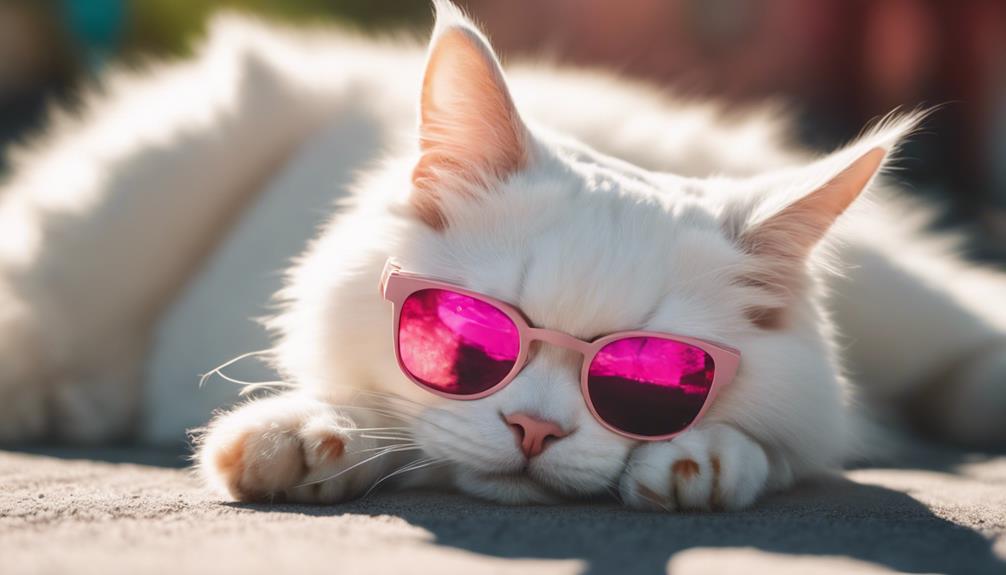
Skin cancer poses a significant health risk for cats, particularly those that have experienced sunburns and prolonged sun exposure. Just like in humans, excessive sun exposure can increase the likelihood of skin cancer in cats.
The harmful UV rays can damage the DNA in their skin cells, leading to the development of cancerous growths. Cats with light-colored or thin fur, as well as those with white or hairless coats, are at a higher risk of developing skin cancer due to their reduced natural protection from the sun.
It is essential to be vigilant about protecting your cat from the sun to reduce the risk of skin cancer and other sun-related health issues.
Sunburn Incidence in Cats
The incidence of sunburn in cats varies depending on factors such as breed, coat color, and sun exposure habits. Cats with light-colored coats or hairless breeds are more susceptible to sunburn compared to those with darker or thicker fur. Outdoor cats that spend extended periods in the sun are at higher risk of developing sunburns, especially on areas like the ears and nose. To illustrate this further, consider the following table:
| Factor | Sunburn Incidence |
|---|---|
| Light-colored coat | High |
| Hairless breeds | High |
| Dark-colored coat | Low |
Understanding these factors can help cat owners take proactive measures to protect their feline companions from the harmful effects of sunburn.
Cat Breeds and Susceptibility
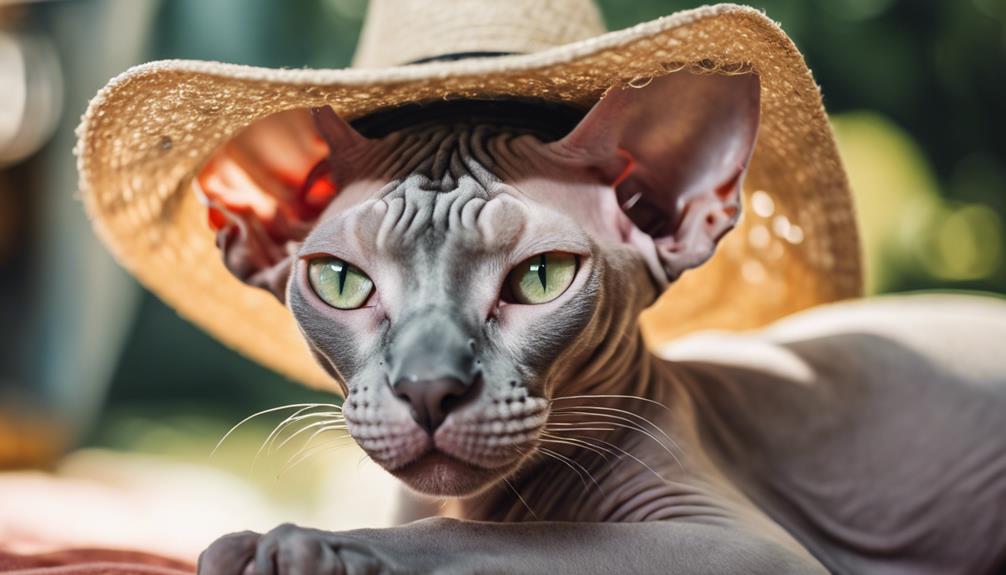
When considering the vulnerability of different cat breeds to sunburn, it becomes evident that their coat color and thickness play a significant role in determining susceptibility.
- White Cats: Cats with white fur are more prone to sunburn due to lower melanin protection.
- Hairless Breeds: Hairless cats, like the Sphynx, have little to no natural protection against the sun's harmful rays.
- Limited Hair Cats: Breeds with sparse fur coverage, such as the Cornish Rex, also face higher susceptibility to sunburn.
Understanding these breed-specific vulnerabilities can help cat owners take necessary precautions to protect their feline friends from the dangers of sunburn.
Hair Type and Sunburn Risk
Certain cat breeds with specific hair types are at a higher risk of sunburn due to their reduced natural protection against UV rays. White, hairless, or limited hair breeds are most susceptible to sunburn, while cats with darker or thicker hair, such as Maine Coons, are less prone to sunburn.
Hairless or white cats, like the Sphynx breed, require extra protection from sun exposure due to their lack of fur shielding. Limiting sun exposure is vital for these susceptible cat breeds, even for indoor cats who may still be exposed to indirect sunlight.
Understanding your cat's hair type and vulnerability to sunburn can help in taking proactive measures to prevent potential skin damage and discomfort.
Prevention for White Cats
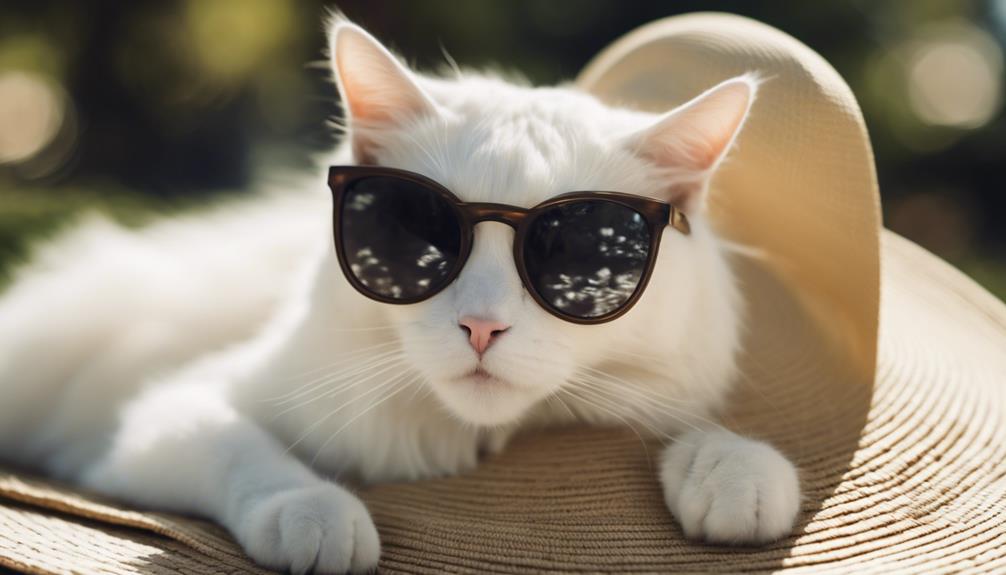
Implementing effective sun protection measures is crucial for safeguarding white cats from the harmful effects of sun exposure. White cats are more susceptible to sunburns due to their lack of pigmentation, making it essential to take proactive steps to shield them from the sun's rays.
Here are some ways to protect your white feline companion:
- Provide shaded areas: Create shaded spots in your home or yard where your white cat can seek refuge from direct sunlight.
- Use pet-safe sunscreen: Apply a pet-specific sunscreen to your cat's ears, nose, and any other exposed areas to prevent sunburn.
- Limit outdoor time: Especially during peak sun hours, restrict your white cat's outdoor activities to minimize sun exposure and reduce the risk of sunburns.
Importance of Limiting Sun Exposure
To safeguard white cats from the detrimental effects of sun exposure, it is imperative to understand the importance of limiting their time under direct sunlight. Cats with white fur, limited hair, or hairless breeds are particularly susceptible to sunburns and potential skin cancer.
By reducing their exposure to direct sunlight, especially during peak hours when the sun's rays are strongest, cat owners can significantly lower the risk of sunburns and related health issues. Limiting sun exposure is crucial not only for outdoor cats but also for indoor cats near windows where sunlight streams in.
Taking proactive measures to protect susceptible cats from excessive sun exposure is key to ensuring their well-being and preventing painful sunburns.
Treatment for Sunburn in Cats
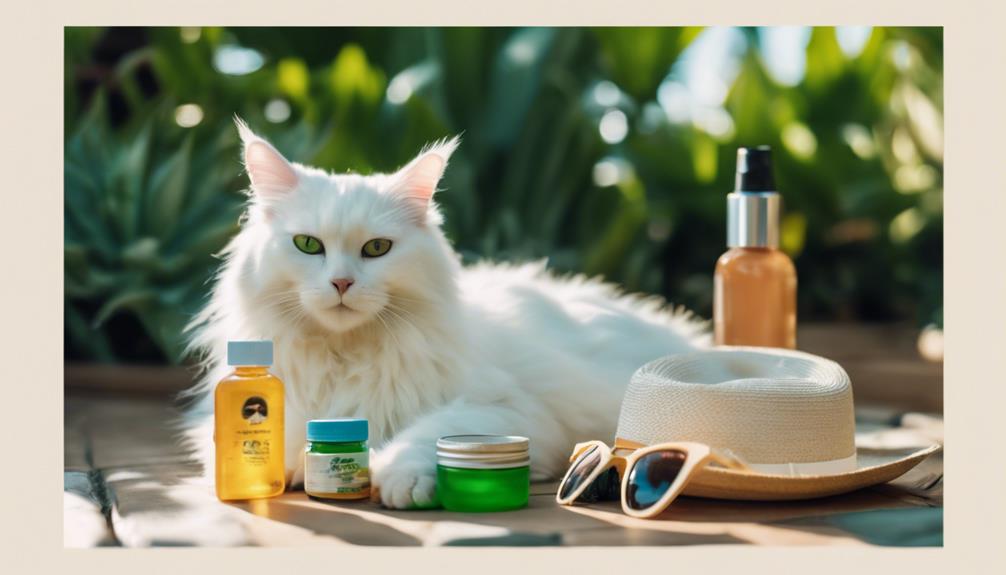
Treatment for sunburn in cats typically involves:
- Cool Compresses: Gently applying cool, damp cloths to the affected areas can help soothe the sunburn and reduce inflammation.
- Aloe Vera Gel: Applying a small amount of aloe vera gel, specifically formulated for pets, can provide relief and promote healing of the sunburned skin.
- Hydration: Encouraging your cat to drink water can help prevent dehydration, especially if the sunburn is causing discomfort and reluctance to eat or drink.
Consulting a Veterinarian
When faced with concerning signs of sunburn in your cat, seeking guidance from a qualified veterinarian is essential to ensure proper diagnosis and treatment.
A veterinarian can provide expert advice on how to manage your cat's sunburn, recommend suitable treatment options, and assess any potential complications that may arise. They have the expertise to determine the severity of the sunburn and tailor a treatment plan specific to your cat's needs.
Additionally, a veterinarian can offer guidance on preventive measures to protect your cat from future sunburns. By consulting a veterinarian promptly, you can address any issues related to sunburn in your cat effectively and ensure their well-being is safeguarded.
Related Pet Care Considerations
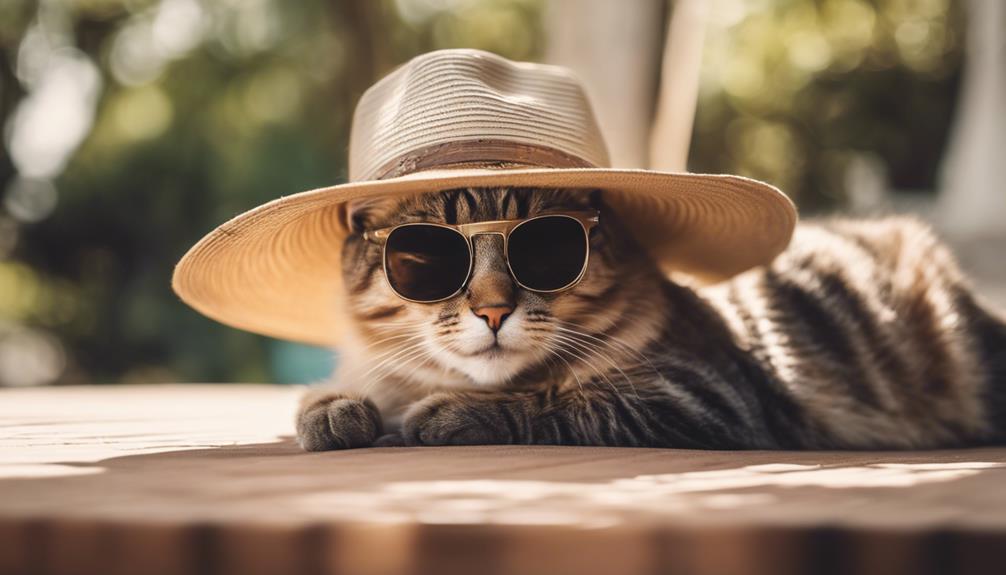
Which pet care considerations are essential to address alongside preventing sunburns in cats? Here are three key factors to keep in mind for comprehensive pet care:
- Regular Veterinary Check-ups: Just like consulting a vet for sunburns, routine check-ups help identify potential health issues early on.
- Proper Nutrition and Hydration: Ensuring your pet has a balanced diet and access to fresh water is vital for their overall well-being, especially during hot weather.
- Monitoring Behavior Changes: Stay attentive to any alterations in your pet's behavior, as it could indicate underlying health concerns. A keen eye on their habits can help address issues promptly.
Prioritizing these care considerations alongside sunburn prevention can enhance your pet's quality of life.
Frequently Asked Questions
Can Cats Develop Immunity to Sunburn Over Time With Repeated Sun Exposure?
Cats do not develop immunity to sunburn through repeated exposure. Sunburn risks persist, especially for susceptible breeds. Preventing exposure during peak hours and using protective measures like shade and pet-safe sunscreen remain crucial for safeguarding cats from sunburn-related complications.
Are There Any Specific Dietary Supplements That Can Help Prevent Sunburn in Cats?
While specific dietary supplements have not been proven to prevent sunburn in cats, ensuring a balanced diet rich in essential nutrients like Vitamin E and Omega-3 fatty acids may support overall skin health. Consulting a vet for tailored advice is recommended.
How Can You Tell if a Cat's Sunburn Is Severe Enough to Require Immediate Veterinary Attention?
Recognizing severe sunburn in cats necessitates vigilance for signs like blistering, extreme redness, or behavioral changes. Immediate veterinary attention is crucial if these indicators manifest, as prompt treatment can prevent complications and ensure feline well-being.
Are There Any Natural Remedies or Home Treatments for Sunburn in Cats That Are Safe and Effective?
While natural remedies or home treatments for sunburn in cats may seem appealing, consulting a vet is crucial for safe and effective care. Professional guidance ensures proper treatment, preventing potential harm and ensuring the cat's well-being.
Is There a Specific Age Range of Cats That Are More Susceptible to Sunburn, or Can It Affect Cats of Any Age Equally?
Sunburn susceptibility in cats is not age-dependent. All cats, regardless of age, can suffer from sunburn. Preventive measures, such as limiting sun exposure and providing shade, are crucial for protecting cats of all ages from sunburns.
Conclusion
In conclusion, understanding the risks and signs of sunburn in cats is essential for proactive prevention measures. By limiting sun exposure, choosing appropriate outdoor times, and providing shade, cat owners can protect their pets from the potential harms of sunburn and skin cancer.
Regular monitoring for signs of sunburn, especially in sensitive areas like the ears and nose, can help ensure early detection and prompt treatment, ultimately safeguarding feline well-being.




